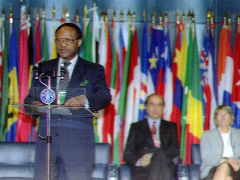


COMMONWEALTH SECRETARIAT (COMSEC) - SECRETARIAT POUR LES PAYS DU COMMONWEALTH - SECRETARIA DEL COMMONWEALTH | ||
Chief Emeka Anyaoku, Secretary-General, Commonwealth Secretariat (COMSEC) | ||

I must first pay tribute to FAO and its far-sighted Director-General, Mr. Jacques Diouf, for organizing this historic Summit. Food Security is a continuing global problem. The hopes expressed by the 1974 World Food Conference that within a decade no child will go to bed hungry have failed to materialize. Tonight 200 million children will go to bed hungry. Why that should be the case, given the significant increases that have occurred in world food production, must be among the questions that should occupy this Summit. Among the many factors which are to blame are the lack of global political commitment, inadequate resources, burgeoning population growth in vulnerable nations, civil strife and warfare, natural or man-made disasters in food-insecure regions, a failure to take into account the special role and needs of women, and the failure to involve poor and hungry people in the design and implementation of development programmes meant to assist them. We in the Commonwealth of 53 sovereign states firmly believe that poverty is a root cause of food insecurity. We also believe that in order to overcome poverty we need peaceful conditions, together with social, political and economic stability. For the Commonwealth, the interrelated problems of food insecurity and poverty are keenly felt. Within the membership seven countries alone account for over 40% of the world's rural poor and hungry, and one-half of the world's poor children are found in just three Commonwealth Nations. We strive to establish an enabling macro-economic trading environment, particularly as this affects the distribution of food which is sometimes abundantly available but far from the centres of need. But markets alone cannot solve food security problems. In food-insecure countries, national governments need to focus attention on domestic food production as well as regional opportunities to secure food and to ensure equal and equitable access to it. In this context, I would like to mention an aspect that is of particular concern to the Commonwealth. Women are over-represented among the poor and the malnourished, even in those countries where they play a central role in the food cycle. In many such countries, although women dominate in the production, harvesting, storage, marketing, processing and preparation of food, they usually have little control over related financial and other resources. To encourage the process of correcting this situation, the Commonwealth Secretariat recently completed a handbook on incorporating gender into food security policies, with particular reference to Commonwealth Africa. The handbook provides practical guidelines on how to effectively accommodate gender concerns in food policies. It addresses the constraints that limit the ability of women to provide their households with food and focuses on the changing roles of men and women in food production. In focussing specifically on gender, the handbook is a practical instrument of technical assistance developed in association with the Commonwealth Plan of Action on Gender and Development. The challenge of achieving sustainable global food security within the next 15 or 20 years is a challenge to governments and non-governmental organizations alike. Global food security requires long-term planning and commitment by the global community. It requires that we globally address the demographic and environmental factors that impinge on its realization. Above all it requires acceptance that our common humanity obliges all our nations to be truly concerned for the world's 800 million malnourished men, women and children. I strongly believe that Food for All is achievable. Let this great gathering, through the Summit Plan of Action, provide the means and the political will to make it a reality. | ||
|
|
|
|

 |